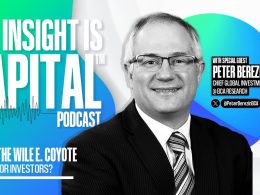by Greg Valliere, AGF Management Ltd.
A DRAMATIC SHIFT IN WASHINGTON: Rarely have we seen such a sea-change from the public and the politicians — the budget deficit simply isn’t a top priority; no one has any credible program (or the desire) to address the staggering rise of red ink.
TOTAL U.S. DEBT WILL EASILY EXCEED $30 TRILLION by the middle of this decade, thanks to deficits of more than $3 trillion in this fiscal year, which ends in two weeks, and another $2 trillion in fiscal 2021.
ANNUAL DEFICITS OF OVER $1 TRILLION WERE CERTAIN even before the Pandemic hit, as both political parties embraced higher spending and rejected any significant budget cuts. The path of least resistance has always been to spend more, and now there’s the Modern Monetary Theory, which argues that deficits aren’t important when interest rates are at rock-bottom lows — and demand for Treasury paper seemingly has no limit.
IN A LITTLE-NOTICED ANNOUNCEMENT recently, the Treasury Department said that net borrowing costs will fall this year and next, thanks to low interest rates. As long as the Federal Reserve keeps rates close to zero for the the next two or three years, debt servicing costs will be tolerable.
ONLY A HANDFUL OF POLITICIANS, mostly all conservative Republicans, are calling for deficit reduction. They decry the red ink but their prescriptions are politically radioactive — significant deficit reduction would require deep spending cuts, tax hikes and reducing the growth of Social Security and Medicare, all of which have little political appeal.
WHOEVER WINS THE ELECTION will want to spend more. Trump, seemingly unconcerned by deficits, will seek to increase outlays for space-based defense, a wall with Mexico, and infrastructure. His proposed spending cuts would be dead on arrival in Congress, and he will seek to make his tax cuts permanent.
JOE BIDEN would dramatically increase spending on health care, student loan relief, alternative energy, infrastructure, etc. Biden would seek higher taxes — not to
reduce deficits, but to pay for ambitious new government programs.
HOW LONG CAN THIS CONTINUE? Huge deficits will persist until the bond market rebels, but Jerome Powell and the Fed have made it clear that they will keep rates near zero for years to come. And they favor more spending to cope with the virus, which Powell undoubtedly will emphasize in his press conference tomorrow.
THIS WILLINGNESS TO SPEND far in excess of incoming revenues eventually will end badly, but that day of reckoning isn’t imminent.
IN THE MEANTIME, the biggest beneficiary should
be residential real estate, which will continue to enjoy astonishingly low interest rates. Could the economy eventually face bubbles? Of course — but why fight the Fed, which faces no resistance as it accommodates the surging the debt?
The views expressed in this blog are those of the author and do not necessarily represent the opinions of AGF, its subsidiaries or any of its affiliated companies, funds or investment strategies.
The views expressed in this blog are provided as a general source of information based on information available as of the date of publication and should not be considered as personal investment advice or an offer or solicitation to buy and/or sell securities. Speculation or stated believes about future events, such as market or economic conditions, company or security performance, or other projections represent the beliefs of the author and do not necessarily represent the view of AGF, its subsidiaries or any of its affiliated companies, funds or investment strategies. Every effort has been made to ensure accuracy in these commentaries at the time of publication; however, accuracy cannot be guaranteed. Market conditions may change and AGF accepts no responsibility for individual investment decisions arising from the use of or reliance on the information contained herein. Any financial projections are based on the opinions of the author and should not be considered as a forecast. The forward looking statements and opinions may be affected by changing economic circumstances and are subject to a number of uncertainties that may cause actual results to differ materially from those contemplated in the forward looking statements. The information contained in this commentary is designed to provide you with general information related to the political and economic environment in the United States. It is not intended to be comprehensive investment advice applicable to the circumstances of the individual.
AGF Investments is a group of wholly owned subsidiaries of AGF Management Limited, a Canadian reporting issuer. The subsidiaries included in AGF Investments are AGF Investments Inc. (AGFI), AGF Investments America Inc. (AGFA), AGF Asset Management (Asia) Limited (AGF AM Asia) and AGF International Advisors Company Limited (AGFIA). AGFA is a registered advisor in the U.S. AGFI is registered as a portfolio managers across Canadian securities commissions. AGFIA is regulated by the Central Bank of Ireland and registered with the Australian Securities & Investments Commission. AGF AM Asia is registered as a portfolio manager in Singapore. The subsidiaries that form AGF Investments manage a variety of mandates comprised of equity, fixed income and balanced assets.
About AGF Management Limited
Founded in 1957, AGF Management Limited (AGF) is an independent and globally diverse asset management firm. AGF brings a disciplined approach to delivering excellence in investment management through its fundamental, quantitative, alternative and high-net-worth businesses focused on providing an exceptional client experience. AGF’s suite of investment solutions extends globally to a wide range of clients, from financial advisors and individual investors to institutional investors including pension plans, corporate plans, sovereign wealth funds and endowments and foundations.
For further information, please visit AGF.com.
© 2020 AGF Management Limited. All rights reserved.
This post was first published at the AGF Perspectives Blog.















